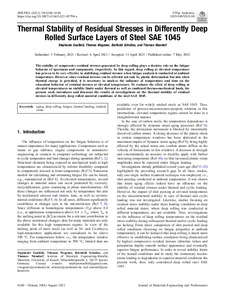Datum
2021-05-07Schlagwort
620 Ingenieurwissenschaften 660 Chemische Verfahrenstechnik, Technische Chemie StahlAlterungMaterialermüdungThermische BelastungEigenspannungMetadata
Zur Langanzeige
Aufsatz
Artikel (Publikationen im Open Access gefördert durch die UB)

Thermal Stability of Residual Stresses in Differently Deep Rolled Surface Layers of Steel SAE 1045
Zusammenfassung
The stability of compressive residual stresses generated by deep rolling plays a decisive role on the fatigue behavior of specimens and components, respectively. In this regard, deep rolling at elevated temperature has proven to be very effective in stabilizing residual stresses when fatigue analysis is conducted at ambient temperature. However, since residual stresses can be affected not only by plastic deformation but also when thermal energy is provided, it is necessary to analyze the influence of temperature and time on the relaxation behavior of residual stresses at elevated temperature. To evaluate the effect of deep rolling at elevated temperatures on stability limits under thermal as well as combined thermo-mechanical loads, the present work introduces and discusses the results of investigations on the thermal stability of residual stresses in differently deep rolled material conditions of the steel SAE 1045.
Zitierform
In: Journal of Materials Engineering and Performance (JMEP) Volume 30 / Issue 8 (2021-05-07) , S. 6160-6166 ; eissn:1544-1024Förderhinweis
Gefördert im Rahmen des Projekts DEALSammlung(en)
Publikationen (Fachgebiet Metallische Werkstoffe)Artikel (Publikationen im Open Access gefördert durch die UB)
Zitieren
@article{doi:10.17170/kobra-202108064501,
author={Saalfeld, Stephanie and Wegener, Thomas and Scholtes, Berthold and Niendorf, Thomas},
title={Thermal Stability of Residual Stresses in Differently Deep Rolled Surface Layers of Steel SAE 1045},
journal={Journal of Materials Engineering and Performance (JMEP)},
year={2021}
}
0500 Oax
0501 Text $btxt$2rdacontent
0502 Computermedien $bc$2rdacarrier
1100 2021$n2021
1500 1/eng
2050 ##0##http://hdl.handle.net/123456789/13239
3000 Saalfeld, Stephanie
3010 Wegener, Thomas
3010 Scholtes, Berthold
3010 Niendorf, Thomas
4000 Thermal Stability of Residual Stresses in Differently Deep Rolled Surface Layers of Steel SAE 1045 / Saalfeld, Stephanie
4030
4060 Online-Ressource
4085 ##0##=u http://nbn-resolving.de/http://hdl.handle.net/123456789/13239=x R
4204 \$dAufsatz
4170
5550 {{Stahl}}
5550 {{Alterung}}
5550 {{Materialermüdung}}
5550 {{Thermische Belastung}}
5550 {{Eigenspannung}}
7136 ##0##http://hdl.handle.net/123456789/13239
<resource xsi:schemaLocation="http://datacite.org/schema/kernel-2.2 http://schema.datacite.org/meta/kernel-2.2/metadata.xsd"> 2021-09-13T11:43:32Z 2021-09-13T11:43:32Z 2021-05-07 doi:10.17170/kobra-202108064501 http://hdl.handle.net/123456789/13239 Gefördert im Rahmen des Projekts DEAL eng Namensnennung 4.0 International http://creativecommons.org/licenses/by/4.0/ aging deep rolling fatigue thermal loading residual stress 620 660 Thermal Stability of Residual Stresses in Differently Deep Rolled Surface Layers of Steel SAE 1045 Aufsatz The stability of compressive residual stresses generated by deep rolling plays a decisive role on the fatigue behavior of specimens and components, respectively. In this regard, deep rolling at elevated temperature has proven to be very effective in stabilizing residual stresses when fatigue analysis is conducted at ambient temperature. However, since residual stresses can be affected not only by plastic deformation but also when thermal energy is provided, it is necessary to analyze the influence of temperature and time on the relaxation behavior of residual stresses at elevated temperature. To evaluate the effect of deep rolling at elevated temperatures on stability limits under thermal as well as combined thermo-mechanical loads, the present work introduces and discusses the results of investigations on the thermal stability of residual stresses in differently deep rolled material conditions of the steel SAE 1045. open access Saalfeld, Stephanie Wegener, Thomas Scholtes, Berthold Niendorf, Thomas doi:10.1007/s11665-021-05798-x Stahl Alterung Materialermüdung Thermische Belastung Eigenspannung publishedVersion eissn:1544-1024 Issue 8 Journal of Materials Engineering and Performance (JMEP) 6160-6166 Volume 30 false </resource>
Die folgenden Lizenzbestimmungen sind mit dieser Ressource verbunden:


